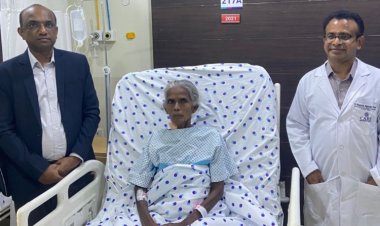Fluid restriction during heart failure

A fluid restriction has long been considered one of the cornerstones in self-care management of patients with heart failure. Heart failure is a condition in which the heart is no longer able to pump oxygen-rich blood to the rest of the body efficiently. This causes fluid to build up in the body. So, a common recommendation to patients with heart failure is a fluid restriction. Congestive Heart failure is a vicious cycle. The activation of renin angiotensin system related to kidney through vicious cycle causes retention of fluid in the body of heart failure patients. Since there is retention of fluid in patients with congestive heart failure, fluid intake is restricted to avoid further stress on heart. The cardiologist usually advises maximum daily fluid intake to a patient after clinical evaluation.
%2C%20FACC(U_S_A)%20Director%20-%20Cath%20lab%20Chief%20Interventional%20Cardiologist%20Chief%20Cardiac%20Transplant%20Physician%20of%20Gleneagles%20Global%20Hospitals%2C%20Hyderabad(1).jpg) Dr. M. Sai Sudhakar, MD.DM FRCP(Edin), FACC(U.S.A) Director - Cath lab Chief Interventional Cardiologist Chief Cardiac Transplant Physician of Gleneagles Global Hospitals, Hyderabad talks about the symptoms, causes leading to heart failure congestion.
Dr. M. Sai Sudhakar, MD.DM FRCP(Edin), FACC(U.S.A) Director - Cath lab Chief Interventional Cardiologist Chief Cardiac Transplant Physician of Gleneagles Global Hospitals, Hyderabad talks about the symptoms, causes leading to heart failure congestion.
Heart failure congestion symptoms may include:
- Shortness of breath (dyspnea) when you exert yourself or when you lie down.
- Fatigue and weakness
- Swelling (edema) in your legs, ankles and feet
- Rapid or irregular heartbeat
- Reduced ability to exercise
- Persistent cough or wheezing with pink blood-tinged phlegm
- Increased need to urinate at night
- Swelling of your abdomen (ascites)
- Very rapid weight gain from fluid retention
- Lack of appetite and nausea
- Difficulty concentrating or decreased alertness
- Chest pain if your heart failure is caused by a heart attack.
Causes:
Congestion causes respiratory distress (difficulty in breathing) to patients. So, volume regulation, assessment, and congestion management remain basic issues in patients with heart failure. Congestion management through diuretics (drugs causing urination), and other medications is of core importance to relieve patients’ symptoms.
Also, volume management by restricting fluid intake of total free water to less than 1.5 L- 2L a day along with Sodium restriction up to 2gm per day is crucial to remain symptom free. Sodium restriction is important because sodium retains fluid in the body.
Prevention:
The daily water intake depends on the doctor's advice based on the clinical condition of the patient. Water consumption shall be regular throughout the day rather than consuming a large amount of water at 2 or 3 times only. One should be aware of the water content of food consumed as one can end up consuming more than the advised amount of water, through food while drinking just 1 or 2 glasses of water. To keep oneself hydrated, one should avoid exertion, heat exposure, direct sunlight and any activity causing excessive exertion as dehydration is not good for health particularly for kidney function.
Management of heart failure is a broad topic starts from simple lifestyle modifications to advance treatments like medications, device therapies and heart transplant, but Lifestyle modifications in the form of dietary changes, activities and exercise as per medical advice are as important as medications at basic level.

 Disclaimer: Welthi.com does not guarantee any specific results as a result of the procedures mentioned here, and the results may vary from person to person.
Disclaimer: Welthi.com does not guarantee any specific results as a result of the procedures mentioned here, and the results may vary from person to person.









